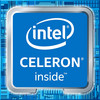Intel Core i7-4558U vs Intel Celeron 3865U
Intel Core i7-4558U
► remove from comparison
Der Intel Core i7-4558U ist ein sparsamer Dual-Core-Prozessor auf Basis der Haswell-Architektur, der für den Einsatz in großen Ultrabooks vorgesehen ist. Dank Hyperthreading können die 2 Kerne gleichzeitig bis zu 4 Threads bearbeiten. Die in 22 Nanometer gefertigte CPU taktet mit 2,8 GHz, kann per Turbo Boost aber Frequenzen von bis zu 3,3 GHz erreichen (2 Kerne: 3,2 GHz).
Haswell ist der Nachfolger der 2012 vorgestellten Ivy-Bridge-Architektur und soll vor allem mit höherer Performance und verbesserter Energieeffizienz punkten. So wurde sowohl die Sprungvorhersage optimiert als auch die Zahl der Ausführungseinheiten erhöht, was insbesondere bei Verwendung von Hyper-Threading deutliche Leistungszuwächse verspricht. Neue Befehlssatzerweiterungen wie AVX2 und FMA sollen die Performance in darauf ausgelegten Anwendungen zusätzlich verbessern. Eine Besonderheit der ULV-Versionen ist die Integration des Chipsatzes auf das CPU-Package, um dadurch Leistungsaufnahme und Platzbedarf zu senken.
Die Performance des Core i7-4558U liegt entsprechend der gesteigerten Pro-MHz-Leistung in etwa auf dem Niveau des Ivy-Bridge-basierten Core i7-3540M mit etwas höherer Taktrate. Unter Einsatz der neuen Befehlssätze wie AVX2 kann die Leistung aber auch deutlich besser ausfallen. Damit stehen nicht nur für Office- und Multimedia-Zwecke, sondern auch für anspruchsvolle Anwendungen ausreichende Reserven zur Verfügung.
Für die Grafikausgabe zeigt sich die im Prozessor integrierte Intel Iris Graphics 5100 (40 EUs) verantwortlich, die mit 200 - 1200 MHz taktet. Diese verspricht ein deutliches Performanceplus gegenüber der HD Graphics 4000, was die Iris Graphics in Schlagdistanz zu einigen dedizierte Mittelklasse-Grafikkarten bringt.
Der Core i7-4558U liegt in der mit Haswell neu eingeführten TDP-Klasse von 28 Watt, die insbesondere für größere Ultrabooks im Format von 14 - 15 Zoll konzipiert wurde.
Intel Celeron 3865U
► remove from comparison
Der Intel Celeron 3865U ist ein sparsamer Dual-Core-SoC auf Basis der Kaby-Lake-Architektur, der im 1. Quartal 2017 vorgestellt wurde. Die CPU wird hauptsächlich in Ultrabooks, aber auch gewöhnlichen Notebooks verbaut. Neben den zwei CPU-Kernen ohne Hyper-Threading, die mit 1,8 GHz takten (kein Turbo Boost), integriert der Prozessor auch eine HD Graphics 610 Grafikeinheit sowie einen Dual-Channel-Speichercontroller (LPDDR3-1866/DDR4-2133/DDR3L-1600). Die Fertigung erfolgt in einem 14-Nanometer-Prozess mit FinFET-Transistoren. Im Vergleich zum ähnlichenIntel Celeron 3965U, ist der Celeron 3865U 400 MHz geringer getaktet.
Architektur
Im Vergleich mit Skylake hat Intel die zugrundeliegende Mikroarchitektur praktisch unverändert übernommen, sodass sich keine Unterschiede in der Pro-MHz-Leistung ergeben. Überarbeitet wurde lediglich die Speed-Shift-Technik zur schnelleren dynamischen Anpassung von Spannungen und Taktraten, zudem gestattet der gereifte 14-Nanometer-Prozess deutlich höhere Frequenzen und eine bessere Energieeffizienz als bislang.
Performance
Der Celeron 3865U ist durch den fehlenden Turbo Boost in Einzelnkernbenchmarks deutlich langsamer als die schnelleren Core Modelle. Diese Einschränkung sollte in der täglichen Nutzung auch spürbar sein. Die Leistung sollte deutlich unterhalb des Intel Pentium 4405U und auch Celeron 3965U liegen, da die beiden Prozessorkerne relative niedrig getaktet werden.
Grafikeinheit
Die integrierte Grafikeinheit namens Intel HD Graphics 610 repräsentiert die kleinste, auch "GT1" genannte Ausbaustufe der Kaby-Lake-GPU (Intel Gen. 9) und taktet im Celeron mit 300 - 900 MHz.
Leistungsaufnahme
Dank "Configurable TDP" kann die CPU ausgehend von den standardmäßigen 15 Watt auch mit einer TDP von 10 Watt (cTDP Down) betrieben werden, wodurch sich jedoch die Performance reduziert. Je nach Einstellung ist der Chip für schlanke Note- und Ultrabooks ab etwa 11 Zoll Bilddiagonale geeignet.
| Model | Intel Core i7-4558U | Intel Celeron 3865U | ||||||||||||||||||||||||||||||||||||||||||||||||||||||||||||||||||||||||||||||||||||||||||||||||||||||||||||||||||||||||||||||||||||||||||||||||||||||||||||||||||||||||||||||||||||||||||||||||||||||||||||||||||||||||||||||||||||||||||||||||||||||||||||||||||||||||||||||||||||||||||||||||||||||||||||||||||||
| Series | Intel Core i7 | Intel Kaby Lake | ||||||||||||||||||||||||||||||||||||||||||||||||||||||||||||||||||||||||||||||||||||||||||||||||||||||||||||||||||||||||||||||||||||||||||||||||||||||||||||||||||||||||||||||||||||||||||||||||||||||||||||||||||||||||||||||||||||||||||||||||||||||||||||||||||||||||||||||||||||||||||||||||||||||||||||||||||||
| Codename | Haswell | Kaby Lake | ||||||||||||||||||||||||||||||||||||||||||||||||||||||||||||||||||||||||||||||||||||||||||||||||||||||||||||||||||||||||||||||||||||||||||||||||||||||||||||||||||||||||||||||||||||||||||||||||||||||||||||||||||||||||||||||||||||||||||||||||||||||||||||||||||||||||||||||||||||||||||||||||||||||||||||||||||||
| Serie: Kaby Lake Kaby Lake |
|
| ||||||||||||||||||||||||||||||||||||||||||||||||||||||||||||||||||||||||||||||||||||||||||||||||||||||||||||||||||||||||||||||||||||||||||||||||||||||||||||||||||||||||||||||||||||||||||||||||||||||||||||||||||||||||||||||||||||||||||||||||||||||||||||||||||||||||||||||||||||||||||||||||||||||||||||||||||||
| Clock | 2800 - 3300 MHz | 1800 MHz | ||||||||||||||||||||||||||||||||||||||||||||||||||||||||||||||||||||||||||||||||||||||||||||||||||||||||||||||||||||||||||||||||||||||||||||||||||||||||||||||||||||||||||||||||||||||||||||||||||||||||||||||||||||||||||||||||||||||||||||||||||||||||||||||||||||||||||||||||||||||||||||||||||||||||||||||||||||
| L1 Cache | 128 KB | 128 KB | ||||||||||||||||||||||||||||||||||||||||||||||||||||||||||||||||||||||||||||||||||||||||||||||||||||||||||||||||||||||||||||||||||||||||||||||||||||||||||||||||||||||||||||||||||||||||||||||||||||||||||||||||||||||||||||||||||||||||||||||||||||||||||||||||||||||||||||||||||||||||||||||||||||||||||||||||||||
| L2 Cache | 512 KB | 512 KB | ||||||||||||||||||||||||||||||||||||||||||||||||||||||||||||||||||||||||||||||||||||||||||||||||||||||||||||||||||||||||||||||||||||||||||||||||||||||||||||||||||||||||||||||||||||||||||||||||||||||||||||||||||||||||||||||||||||||||||||||||||||||||||||||||||||||||||||||||||||||||||||||||||||||||||||||||||||
| L3 Cache | 4 MB | 2 MB | ||||||||||||||||||||||||||||||||||||||||||||||||||||||||||||||||||||||||||||||||||||||||||||||||||||||||||||||||||||||||||||||||||||||||||||||||||||||||||||||||||||||||||||||||||||||||||||||||||||||||||||||||||||||||||||||||||||||||||||||||||||||||||||||||||||||||||||||||||||||||||||||||||||||||||||||||||||
| Cores / Threads | 2 / 4 | 2 / 2 | ||||||||||||||||||||||||||||||||||||||||||||||||||||||||||||||||||||||||||||||||||||||||||||||||||||||||||||||||||||||||||||||||||||||||||||||||||||||||||||||||||||||||||||||||||||||||||||||||||||||||||||||||||||||||||||||||||||||||||||||||||||||||||||||||||||||||||||||||||||||||||||||||||||||||||||||||||||
| TDP | 28 Watt | 15 Watt | ||||||||||||||||||||||||||||||||||||||||||||||||||||||||||||||||||||||||||||||||||||||||||||||||||||||||||||||||||||||||||||||||||||||||||||||||||||||||||||||||||||||||||||||||||||||||||||||||||||||||||||||||||||||||||||||||||||||||||||||||||||||||||||||||||||||||||||||||||||||||||||||||||||||||||||||||||||
| Transistors | 1300 Million | |||||||||||||||||||||||||||||||||||||||||||||||||||||||||||||||||||||||||||||||||||||||||||||||||||||||||||||||||||||||||||||||||||||||||||||||||||||||||||||||||||||||||||||||||||||||||||||||||||||||||||||||||||||||||||||||||||||||||||||||||||||||||||||||||||||||||||||||||||||||||||||||||||||||||||||||||||||
| Technology | 22 nm | 14 nm | ||||||||||||||||||||||||||||||||||||||||||||||||||||||||||||||||||||||||||||||||||||||||||||||||||||||||||||||||||||||||||||||||||||||||||||||||||||||||||||||||||||||||||||||||||||||||||||||||||||||||||||||||||||||||||||||||||||||||||||||||||||||||||||||||||||||||||||||||||||||||||||||||||||||||||||||||||||
| Die Size | 181 mm2 | |||||||||||||||||||||||||||||||||||||||||||||||||||||||||||||||||||||||||||||||||||||||||||||||||||||||||||||||||||||||||||||||||||||||||||||||||||||||||||||||||||||||||||||||||||||||||||||||||||||||||||||||||||||||||||||||||||||||||||||||||||||||||||||||||||||||||||||||||||||||||||||||||||||||||||||||||||||
| max. Temp. | 100 °C | 100 °C | ||||||||||||||||||||||||||||||||||||||||||||||||||||||||||||||||||||||||||||||||||||||||||||||||||||||||||||||||||||||||||||||||||||||||||||||||||||||||||||||||||||||||||||||||||||||||||||||||||||||||||||||||||||||||||||||||||||||||||||||||||||||||||||||||||||||||||||||||||||||||||||||||||||||||||||||||||||
| Socket | FCBGA | BGA | ||||||||||||||||||||||||||||||||||||||||||||||||||||||||||||||||||||||||||||||||||||||||||||||||||||||||||||||||||||||||||||||||||||||||||||||||||||||||||||||||||||||||||||||||||||||||||||||||||||||||||||||||||||||||||||||||||||||||||||||||||||||||||||||||||||||||||||||||||||||||||||||||||||||||||||||||||||
| Features | Iris Graphics 5100 (200 - 1200 MHz), DDR3(L)-1600 Memory Controller, HyperThreading, AVX, AVX2, Quick Sync, Virtualization, AES-NI | Dual-Channel LPDDR3-1866/DDR4-2133/DDR3L-1600 Memory Controller, HyperThreading, AVX, AVX2, Quick Sync, Virtualization, AES-NI | ||||||||||||||||||||||||||||||||||||||||||||||||||||||||||||||||||||||||||||||||||||||||||||||||||||||||||||||||||||||||||||||||||||||||||||||||||||||||||||||||||||||||||||||||||||||||||||||||||||||||||||||||||||||||||||||||||||||||||||||||||||||||||||||||||||||||||||||||||||||||||||||||||||||||||||||||||||
| iGPU | Intel Iris Graphics 5100 (200 - 1200 MHz) | Intel HD Graphics 610 (300 - 900 MHz) | ||||||||||||||||||||||||||||||||||||||||||||||||||||||||||||||||||||||||||||||||||||||||||||||||||||||||||||||||||||||||||||||||||||||||||||||||||||||||||||||||||||||||||||||||||||||||||||||||||||||||||||||||||||||||||||||||||||||||||||||||||||||||||||||||||||||||||||||||||||||||||||||||||||||||||||||||||||
| Architecture | x86 | x86 | ||||||||||||||||||||||||||||||||||||||||||||||||||||||||||||||||||||||||||||||||||||||||||||||||||||||||||||||||||||||||||||||||||||||||||||||||||||||||||||||||||||||||||||||||||||||||||||||||||||||||||||||||||||||||||||||||||||||||||||||||||||||||||||||||||||||||||||||||||||||||||||||||||||||||||||||||||||
| $454 U.S. | $107 U.S. | |||||||||||||||||||||||||||||||||||||||||||||||||||||||||||||||||||||||||||||||||||||||||||||||||||||||||||||||||||||||||||||||||||||||||||||||||||||||||||||||||||||||||||||||||||||||||||||||||||||||||||||||||||||||||||||||||||||||||||||||||||||||||||||||||||||||||||||||||||||||||||||||||||||||||||||||||||||
| Announced | ||||||||||||||||||||||||||||||||||||||||||||||||||||||||||||||||||||||||||||||||||||||||||||||||||||||||||||||||||||||||||||||||||||||||||||||||||||||||||||||||||||||||||||||||||||||||||||||||||||||||||||||||||||||||||||||||||||||||||||||||||||||||||||||||||||||||||||||||||||||||||||||||||||||||||||||||||||||
| Manufacturer | ark.intel.com | ark.intel.com |


 Deutsch
Deutsch English
English Español
Español Français
Français Italiano
Italiano Nederlands
Nederlands Polski
Polski Português
Português Русский
Русский Türkçe
Türkçe Svenska
Svenska Chinese
Chinese Magyar
Magyar